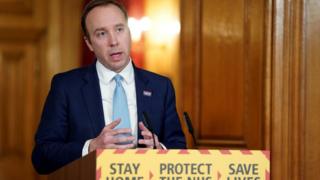
Image copyright
Getty Images
The health secretary said there was huge global demand for protective equipment
Health Secretary Matt Hancock has confirmed Public Health England will be replaced by a new body focused on preparing for external threats like pandemics.
Baroness Dido Harding, who runs NHS Test and Trace in England, will be the interim chief of the new National Institute for Health Protection (NIHP).
PHE has come under intense scrutiny of its coronavirus response.
Ministers have been accused of using PHE as a scapegoat for failings.
Government has been criticised for the controversial decision in March to halt community testing and tracing of contacts.
The new institute will begin work with immediate effect and will bring together Public Health England and NHS Test and Trace, as well as the analytical capability of the Joint Biosecurity Centre under a single leadership team, to “strengthen” public health.
Matt Hancock said it would have a “single and relentless mission” of protecting people from external health threats including pandemics, biological weapons and infections diseases
“To give ourselves the best chance of beating this virus once and for all – and of spotting and being ready to respond to other health threats, now and in the future, we are creating a brand new organisation to provide a new approach to public health protection and resilience.
“My single biggest fear is a novel flu, or another major health alert, hitting us right now in the middle of this battle against coronavirus.
“Even once this crisis has passed – and it will pass – we need a disease control infrastructure that gives us the permanent, standing capacity to respond as a nation and the ability to scale up at pace.”
The new health protection agency for England will, we are told, be modelled on Germany’s Robert Koch Institute which combats infectious diseases.
Expertise from Public Health England and the Test and Trace network will be pooled to form an organisation focussed on tackling the coronavirus threat and future pandemics. And therein lies the historic problem.
PHE was formed as part of Government health reforms in 2012 with an ungainly merger of health protection and prevention initiatives such as obesity strategies. It was pulled in different directions and had to get by with successive annual budget cuts.
PHE has been blamed for the suspension of community testing and tracing in March but senior sources say it was not set up to run a mass diagnostic testing system and any decisions made then were in partnership with Government advisers.
The centrepiece of the reforms is the creation of the new agency but there are still big questions over what will happen to PHE’s vital work on prevention of ill health and tackling health inequalities.
The Royal Society for Public Health (RSPH) questioned the timing of an announcement on the scrapping of a national public health agency in the midst of a global pandemic.
RSPH chief executive Christina Marriott said: “We recognise that there have been some serious challenges in terms of our response to Covid-19, including the timing of the lockdown, the ongoing ineffectiveness of Tier 2 Track and Trace and postcode-level data previously not being available to directors of public health.”
But she said “multiple lessons” needed to be learned “before solutions can be in place in advance of the winter”, adding: “to do otherwise risks avoidable mistakes in subsequent waves of the pandemic which will only harm the public’s health further.”
Prof Richard Tedder, visiting professor in medical virology at Imperial College London, defended PHE as an “assembly of some of the wisest and most committed microbiologists and epidemiologists you could hope for anywhere”.
He criticised what he called the “persistent meddling from on-high”, which he said had “disenfranchised and fractured” staff “to the great detriment of the UK as a whole”.
Prof Tedder warned the plans to merge existing laboratory staff with NHS Test and Trace were “misplaced” and would “further dismantle” the “irreplaceable” expertise that exists within PHE.
Liberal Democrat Health spokesperson Munira Wilson told the BBC News Channel it was “quite clear” that ministers were trying to deflect responsibility from some of the “terrible decisions” taken, “from the provision of protective equipment, test and trace and the tracing app being botched and a whole series of other blunders through this crisis” then trying to scapegoat PHE as a result.
She said they should be going forward with an independent inquiry so lessons learned could be used in any second wave of the pandemic.
Labour’s shadow health minister Justin Madders said in a tweet that there had been “no transparency or accountability” in Baroness Harding’s appointment.

















